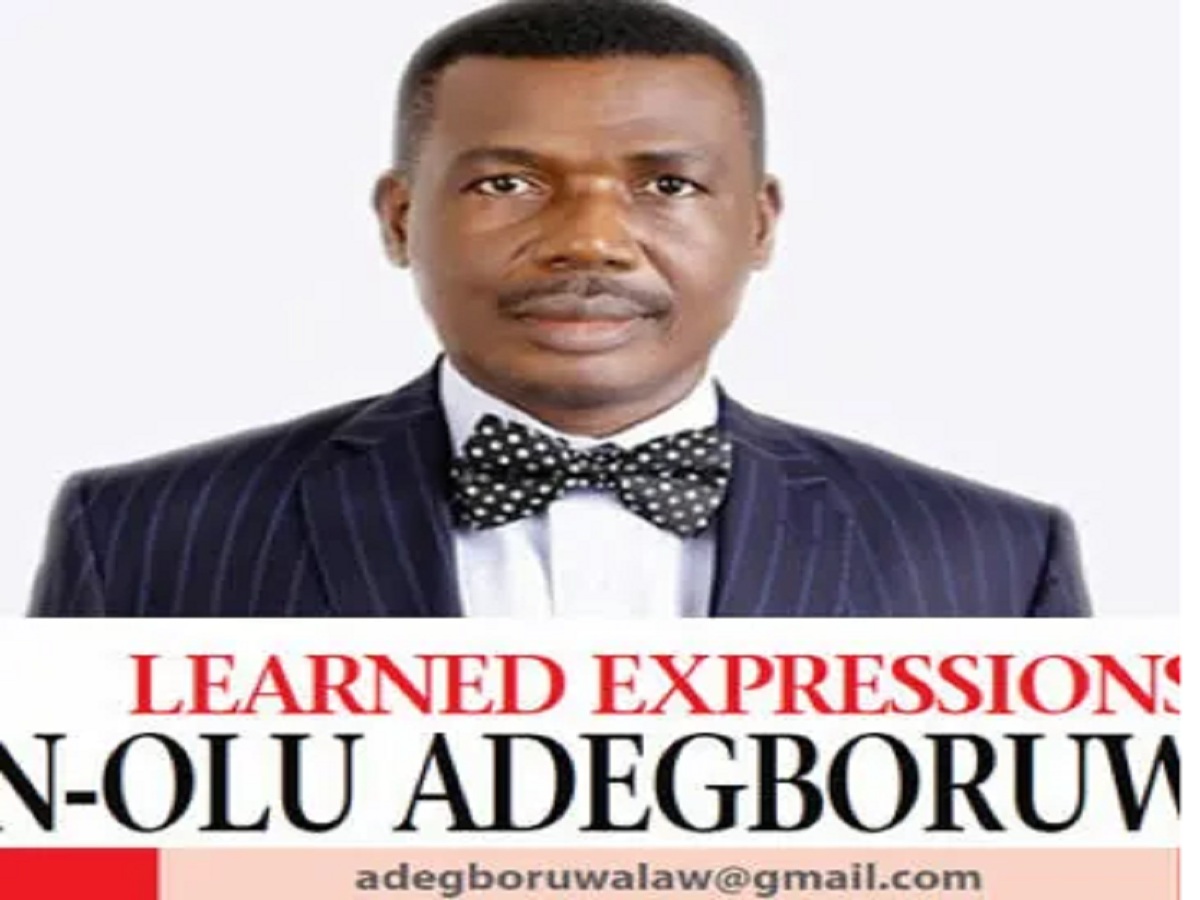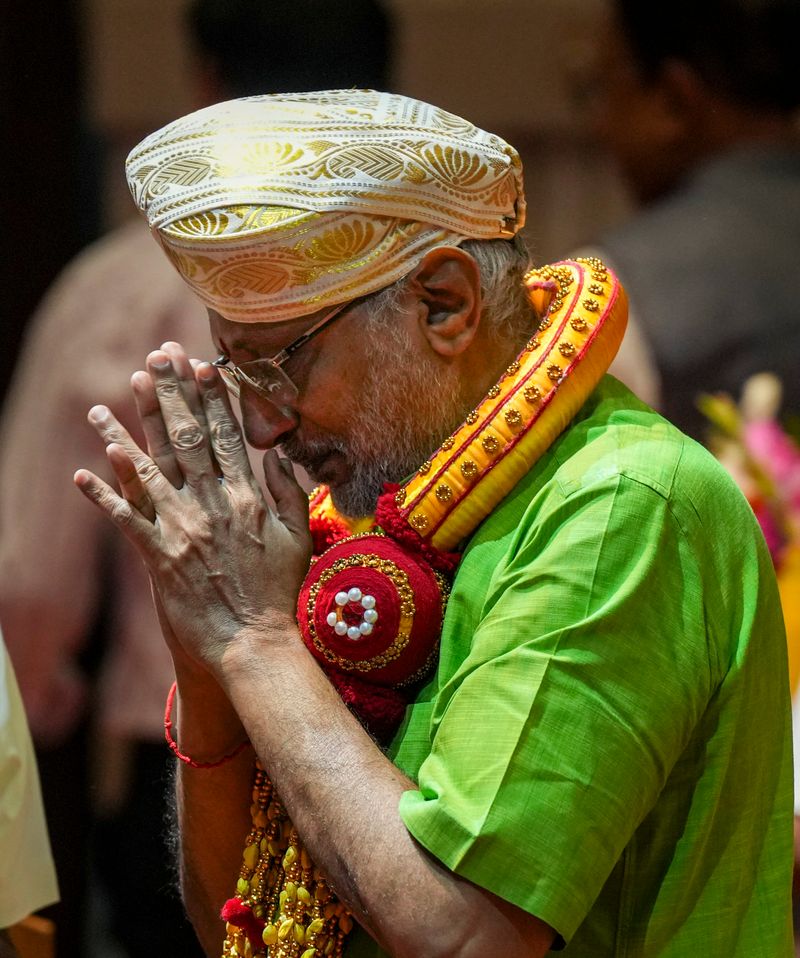By Ebun-Olu Adegboruwa,SAN
Copyright tribuneonlineng

Per TOBI, J.S.C. at pages 214-215, paras. A-B:
“Learned counsel for the 1st appellant dealt exhaustively with the liberal interpretation of the Constitution. His ally, learned counsel for the 2nd appellant, supported him. The liberal approach they commended to this court was aimed at accommodating the guidelines made by the 1st appellant. While this court has consistently championed the liberal interpretation of the Constitution for purposes of expanding the frontiers of the Constitution to accommodate as much foreseeable and proximate situations as possible, this court cannot do so when the provisions of the Constitution are clear and the intention of the makers of the Constitution is thus obvious. The golden and main rule of the interpretation of statutes, including the Constitution, is the intention of the lawmaker. Once the intention of the law-maker is clear, resort cannot be made to any liberal interpretation of the Constitution. This is because a liberal interpretation of the Constitution beyond and above the intention of the lawmaker will amount to the Judge making law. While there is a vibrant debate as to whether the Judge should make law, it will be against the principle of separation of powers for the Judge to make law where the intention of the lawmaker is clear. Perhaps the Judge could be involved in making the law if the intention of the law-maker is not clear and he is in a difficult position in the circumstances of the case before him. In such a circumstance, since he cannot adjourn the matter for the legislature to make a law to place the situation on his hands, he could make the law. Liberal approach to the interpretation of the Constitution is good in relevant situations, but this court cannot do so excessively to the extent that it destroys the fabrics of constitutionalism and constitutionality. All interpretation of the Constitution must bow or kowtow to these twin principles or pillars of constitutional law in our democracy in which the rule of law, democracy’s life blood, triumphs to the egalitarian advantage of Nigeria and its people. Liberalism in the interpretation of the Constitution is good, but too much of it, or better, excess of it, like excess of everything, could be bad and dangerous. If a liberal interpretation of the Constitution will do grave injustice to one of the parties, this court should be loath in taking that course. In other words, this court should keep its borders of interpretation of the Constitution closed if opening them will result in destroying the intention of the makers of the Constitution. This court cannot add one extra word outside the intention of the makers of the Constitution where the constitutional provision is obvious and clear. I realize that learned Senior Advocate for the 1st appellant is taking us on a long and apparently difficult journey in the interpretation of some sections of the Constitution and if we follow him, it will be difficult for us to retrace our steps in other cases in the future. We cannot embark upon such a dangerous journey. No.”
It is evidently clear that the true intent of the drafters of the Constitution as can be gleaned from sections 4, 5, 6, 11 (4) and 1 (2) and 305 is to the effect that this Nation maintains true federalism where clear separation of powers and rule of law reign. It cannot be the intendment of the Constitution to oscillate this Nation between federating and unitary systems. That will be counter-productive. It is pertinent to emphasise that the powers and act of the President to declare a state of emergency in any part of Nigeria must be approved by the National Assembly in line with section 305 (1) and (2) of the Constitution, following a procedure recognized by and acceptable to the Constitution. In this regard, Section 305 of the Constitution is made subject to the provisions of the Constitution. This means that this section is made subject to section 1 (2) of the Constitution and any other part thereof that curtails the powers of the President in exercising his emergency powers. Whatever the President does under and by virtue of section 305 which does not conform with either section 1 or any other section of the Constitution, will always and forever remain unconstitutional. Accordingly, a holistic reading of section 305 (1) and (2) thereof together with section 11 (4) leads to the conclusion that even when the National Assembly has the powers to approve the proclamation of a state of emergency by virtue of section 305 (2), it has not been empowered by the Constitution to ratify the suspension or removal of elected democratic government officials of a state by virtue of section 11 (4) of the CFRN. The one-million-dollar question is this: can the President declare a state of emergency and suspend elected officials without the requisite ratifications by the National Assembly? The answer is in the negative. Secondly, and flowing from above, if the suspension of the elected officials of Rivers State by the President has been ratified by the National Assembly, it therefore means it is the constitutionality of the actions of the President, vis-à-vis the provisions of the Constitution, that is called into question. The other question that flows from the x-ray of this unusual presidential power is this: should the President have reason to declare a state of emergency in all parts of the Federation (such as was done during the Covid-19 pandemic), will he also suspend himself from office and likewise dissolve the National Assembly? Certainly not. It follows that there was no basis for the removal of the Governor of Rivers State and the other elected officials of the State.
A Comment on the Doctrine of Necessity Question
It is noteworthy that the issue of the Doctrine of Necessity which has been brandished by those who support the Proclamation of a state of emergency cannot override the provisions and true spirit of the Constitution. The doctrine of necessity as being applied in Nigerian jurisprudence, allows for actions that are not expressly provided for but incidental to the operation of the Constitution; as a result, it must be in tandem with the spirit of the Constitution. Any theory that takes us outside the Constitution, no matter its convenience or desirability, will be disastrous for precedence. Thus, the doctrine of necessity is not and cannot be a blank cheque to overrule the Constitution or relegate it to the back seat. For it to be applicable, there must be a real and actual threat to the Nigerian state, and its application must be proportionate to the threat or crisis. It cannot be waved to rationalise every and all arbitrary declarations that meet the fancy of those in authority. I dare say that the doctrine of necessity does not allow the federal government to change the federating units of the country or the Constitution itself; hence, it is submitted that the doctrine cannot be used by the President to settle political scores or abuse the very Constitution which created power and handed it over to leaders, and upon which this Nation was built.
Truly, Nigerian constitutional democracy may not have matured into the adult it ought to be but there is no doubt that it is no longer the infant struggling under the suffocating grip of military juntas. Nigeria’s democracy has evolved and we must consolidate it to weather the times and seasons. This is certainly the best way to go, given the peculiar experiences that we have had under the military. The Proclamation of a state of emergency and the annulment of the mandate of the people of Rivers State by the President has actually taken us back several decades to the dark days of military regimes. We must stand up against any potential emergence of imperialism and totalitarianism and insist on the peoples’ mandate and the values of the Constitution.
I believe this topic was chosen for a purpose for this unique gathering of lawyers who preach light in place of darkness, who propagate justice over oppression and wickedness and those who proclaim the rule of law over all forms of arbitrariness. The communique from this conference must echo loudly the voices of truth that we all represent. As apostles of righteousness, we cannot afford to keep mute in the face of flagrant violations of the Constitution, where hope is not renewed, expectations are dashed and democracy is ambushed. I thank you all for the opportunity to share my thoughts with you. May Nigeria succeed.
Last week, Rivers State commenced the process of returning to democracy in a manner reminiscent of the military era. Thanksgiving services were held in preparation for the transition of power from the sole administrator to the elected representatives of the people. It is an aberration that should never happen in our country again. We must develop and deepen our democratic experience to accommodate dissent and principled opposition. People must disagree to agree, peacefully and constructively. Sufficient lessons must have been learnt on all sides by now, with the expectation that the interests of the people of Rivers State should be paramount in the consideration of all the combatants. There is sufficient time for all leaders of thought in Rivers State to rise above the challenges of power sharing, divide and rule and political affiliations, to make the state great, rule in the interest of the common good and deliver a better life for all.
READ MORE FROM: NIGERIAN TRIBUNE



